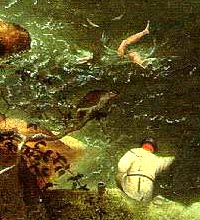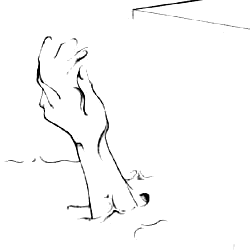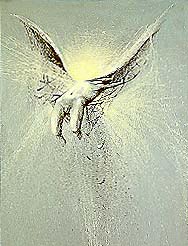


Peter Brueghel the Elder
The Fall of Icarus (C 16th)
Spencer Zahn
Grand Hotel lyrics book (1973)
Michael Ayrton
Icarus Falling III (1959)
Procol HarumBeyond
|
|
|
PH on stage | PH on record | PH in print | BtP features | What's new | Interact with BtP | For sale | Site search | Home |
|
|
Authors: Brooker / Reid |
||
|
Performed: promotionally |
Cover-versions: none |
|
Some bands, recording a song with such an enigmatic title as For Liquorice John, would have included an explanatory sleeve note: not so Procol Harum, for whom at that period the work was all intended to speak for itself. Only in 1998, in the liner note to Ain't Nothing to Get Excited About, did Gary reveal more about his former school-friend Dave Mundy, 'a fanatical supporter of the fledgling Paramounts, about whom he loved everything except the name! He was always trying to get them to change it to Liquorice John Death and his All Stars.' The liner note tells how Mundy, in his early twenties, suffered mental health problems, and how occasional sorties to hear the Paramounts became great highlights in his life. In late 1969 he wrote a lyric for Procol Harum Well I ... which the band played live, and recorded in the 'Liquorice John' sessions, finally released in 1998; Dave Mundy had created the artwork for the album. But in 1972 he escaped from a mental institution and, unable to contact friends, 'flew from the roof of a 15-storey building and found peace. The loss is remembered in For Liquorice John from Procol's Grand Hotel.'
In the Repertoire CD re-release of Grand Hotel Gary vouchsafes to liner-writer Chris Welch that Liquorice John 'died shortly before we made the album.' [In fact the song did not exist when the Grand Hotel sessions started in Dave Ball's time, and Keith Reid told ZigZag (April 1973) 'TV Ceasar and a song called Liquorice John were written in the last period in October [1972]'. Gary told Rock (published December 1972) 'I've got music for some songs that Keith hasn't put words to yet'; yet Keith told Sounds (12 August 1972) that 'All the writing is complete' so the exact chronology is difficult to establish. Reid went on, 'I feel my writing is extremely melancholic its a very strong reflection of myself and Im an extremely melancholic man.' Unusually, in the case of this particular number we do know the cause of this melancholy the remembrance of the passing of the only other lyricist Procol Harum had used. The words were among those he would later select for his book, My Own Choice.
According to Claes Johansen's book (p 130) Dave Mundy had nicknames for all the Paramounts: Trower was 'Humdrum Pete', Copping 'Chris "the man" C', BJ 'Shaky Jake' and Brooker 'Liquorice John Death'. We cannot know what made him choose the word 'Liquorice', but it has not been an uncommon nickname for musicians it puns on 'liquorish', meaning partial to alcoholic drink. The word is also slang for a clarinet and for a black man's penis, neither probably relevant here. The plant liquorice (glycycrrhiza glabra) has blue pea-like flowers, and its nitrogen-fixing roots are used in making sweets (liquorice-sticks) and cough preparations: the crop is heavily concentrated in Pontefract in Yorkshire, as is commemorated in John Betjeman's The Licorice Fields at Pontefract 'her sulky lips were shaped for sin / her sturdy legs were flannel-slack'd'. Chaucer uses the word as a pun with the Middle English for 'lecherous': 'a liquorice mouth must have a lecherous tail' (Wife of Bath's Prologue). 'John' is a Hebrew name deriving from Yah (Jehovah), meaning 'having been gracious'; it's the name of three important Biblical characters as well as many Popes, saints and so forth. It's also slang for 'toilet', and for a prostitute's client, the latter probably since it is one of the most popular names in the English-speaking world, and thus has an 'everyman' connotation. Its cognates in other cultures Hans, Sean, Ian and so on are highly popular too.
Thus, two-thirds of the title: but Keith Reid was adamant about the word 'for': 'When I say for, I mean written for somebody called Liquorice John. It's written for a friend of ours the song tries to say something about his situation He's struggling in the water and the people in the harbour are watching him. The last thing he sees are the people waving at him. They don't realize he's drowning.' The emphasis on a watery death must surely emphasise to us that the title of the song is equally to be heard as Fall Icarus John; and that Reid sees in the fate of Dave Mundy some echo of the tragic legend of Icarus, his aspiration and his solitary death.
Icarus was born in Crete to Daedalus, the inventor, and a slave girl; his father made wings so that they might fly free from the cell in which they were trapped by King Minos following the construction of the Minotaur's labyrinth. Icarus ignored his father's instructions and flew near the sun, causing his wax wings to melt [cp 'my wax is almost run' in All This and More]: Reid's main use of this legend is in Nothing But the Truth, but references to flying can also be found in Rambling On, and to an extent in Learn to Fly.
|
|
|
|
|
Peter Brueghel the Elder |
Spencer Zahn |
Michael Ayrton |
Renaissance moralists used this legend to epitomise the virtues of moderation, but to later years it has also symbolised humanity's questing intellectual spirit. Brueghel (above left) depicted Icarus as a single exposed limb, close to shore; this is a tiny detail of a much larger painting in which the rest of the world goes about its business, oblivious to his fate. Michael Ayrton, who died in 1975, (whose wonderful Daedalus novel The Mazemaker is worth exploring) focused on the heroic aspects of Icarus's flight (above right). Some of Ayrton's Songs of Icarus have been set to music by Australian composer Diarmuid Pigott. Spencer Zahn's illustration in the Grand Hotel lyrics book (above centre) is much more that of Brueghel; in Zahn's case the drowning man is even closer to land: we may wonder why he does not grasp the jetty, though it is box-like and inhospitable. Brueghel's painting is the inspiration for the well-known poem by WH Auden, Musιe des Beaux Arts; Keith Reid has voiced his admiration for Auden, and his own text seems to share something of the tone of Auden's lines 'the ploughman may / have heard the splash, the forsaken cry / but for him it was not an important failure '
But are the words of the song really about drowning? It ends with a flat contradiction: 'he hit the ground he fell into the sea and drowned.' This cannot possibly be an authorial oversight so unless we are to believe that Liquorice John somehow struck the ground and rebounded into the ocean it gives us a good indication of the way Reid wants us to view his narratives: the irreconcilable elements contribute to a dream-like dislocation in which the ideas of falling and loss become experimentally embedded in different sorts of 'real' experiences. Arguably the song is not really about Dave Mundy it lacks any obituarial detail, and seems no more directly related to its ostensible source than Dead Man's Dream is to the film Midnight Cowboy, Reid's springboard in that case. It's worth noting that Reid had a spoken track, Mr Krupp, scheduled for this album (it was performed by the Palers' Band in September 2000); the second part of it adapts an epitaph reported by Gary Brooker's mother, which runs: 'Henry Higgins / Fell from the riggings / In Yokohama harbour / he hit the deck and broke his neck '. This could hardly be closer in theme to For Liquorice John, yet Keith told Zigzag that it was accompanied by 'the crunch of the neck and the thud of the body hitting the deck' there is no doubt that a physical, landward death was in his mind at that time. But the double-focus of the words is mimicked in the double-focus of the title: it's both about Dave Mundy, and about Icarus: about both death on land and death at sea about loss, in fact, with Mundy perhaps as the local focus for a global concern about dying impetus, faith, and control, and the sea as an overwhelming tide of opposition ('a sea of troubles', in Hamlet's phrase). Dying is presented as 'slither[ing] under' in The Dead Man's Dream; many English rock wordsmiths use swimming, drowning etc as metaphors for being a lost soul, such as Wire (Our Swimmer), The Cure (The Drowning Man), and Morrissey (Lifeguard Sleeping, Girl Drowning) this is no doubt due to growing up on a small island surrounded by grey, miserable water. (Of numerous, positive songs entitled (or containing) 'Drowning in a sea of love', many were written by Americans; and some that were not are sustained by self-evidently non-marine metaphors: 'Drowning in a sea of love / Going down for the third time, Baby')
The blurriness of Reid's words here does pose quite a problem for the composer, however, as their main drama is over in the opening couplet (unlike Rambling On, Whaling Stories, A Salty Dog and so on) so the music cannot logically build up to the falling. Despite this the song establishes its rolling, nautical atmosphere and then comes to a dead stop, upon which the fall is enacted musically at its verbal reprise, 'his fall from grace was swift and sure'. The music here is somewhat like the yearning refrain for Robert's Box and extremely like the chorus of TV Ceasar (the first four chords, and their characteristic inversions, are exactly the same: there must have been some 'crosstalk' in the composition of these two songs, both late additions to the roster for Grand Hotel). Lamentational pieces such as this, whose texts lack dramatic thrust, pose a repeated problem for Brooker, and allow producer Chris Thomas to earn his keep handsomely: he has to find a varied, fitting sound-world for songs which would otherwise all seem to merit the folk-dirge treatment heard in Nothing That I didn't Know. Such uncommerciality would presumably have alarmed the Chrysalis paymasters. Thomas evidently felt the pressure of his responsibility: by the time of Exotic Birds he said he 'wasn't coming up for any ideas for the songs' and he and the band parted company after that album.
What were his ideas here, by which the rolling, nautical swirling atmosphere is achieved? "I seem to remember having some very strange set-up with out-of-sound pianos,' said Chris Thomas in The Record Producers, 1982, by Tobler and Grundy. 'I wanted the thing to sound like it was underwater it was something like a twelve-string guitar being played, and then it'd be picked up inside an old jangly piano with Gary playing the same riff which would produce a weird sound you hear a song and get an idea for the atmosphere on the record.' Admirable though his work is, he did here have the benefit of strong material to build on: Gary Brooker's chords are striking, and the verse phrases, which start in F minor, descend to an A major, from which he makes a plangent return to F minor again (a similar chord change marks the mournful mood of Nothing That I Didn't Know). It's a genial paradox of the song that the lines about falling are composed entirely of rising intervals. One of the hallmarks of the song is the haunting semitone-ostinato which is given to the plaintive harmonica: this figuration is derived from the way the chords are arpeggiated in the right hand of the piano, which (albeit in F minor, rather than F major) directly harks back to the start of Wreck of the Hesperus, the band's other main 'falling from grace' song. Arguably Brooker's composition is fresher in harmonic surprises (the variant chords in the last verse in particular), but Fisher's is stronger on drama; in the case of Liquorice John the drama comes from the fluid performance, in which the interplay of piano and drums is one of the track's real revelations.
It may be wishful thinking, but BJ Wilson seems to have felt the tragic emotions of this music keenly, since it appears to have brought out his most passionate drumming, both on record and on stage. His punctuations to the verses are unexpected to the point almost of disrupting the pulse (he pushes and pokes it very effectively); the drumming that follows the middle section is many fans' favourite recorded BJ episode: he was reputed never to play the same thing twice in concert here he scarcely seems to play the same thing twice each time we listen to the record. His stage performances of the song walk a taut tightrope of inspired irrationality, with Gary's piano as the only safety net (mp3 here). The piano's rolling motif is initially played in 7/8, then in 4/4; towards the end of the song it reverts to 7/8 while the drums (each bar marked by a rattle of the ass's jawbone) carry on in straight time. One might assume that the cross-rhythms of this final section, which rock a choppy lullaby of drowning, were playable only in the controlled conditions of the studio, but Brooker and Wilson were able to counterfeit them exactly on stage. The song was played all too rarely, but those of us who heard it live were witness to an extraordinary double-act whose irretrievability is a great sadness. Gary supposedly used an electronic device to recapture the recorded piano sound on stage, but this is not apparent on the recordings that survive. Mick Grabham's contributions were confined to the middle section, and the harmonica part from the record was taken by the piano; we do not know of any instance of harmonica having been used in a live Procol gig. Much more organ was heard on stage than on the record, where two pianos answer each other's call; the organ's chief contribution is to provide sustain on that last, booming chord of doom: very similar indeed to the ending of The Dead Man's Dream, the only other Procol Harum song to end with the word 'under'.
For Liquorice John was played for the first time during a British tour (March 1973), and featured strongly during that year's gigs. Gary seemed distressed in the US, however, when audiences showed insufficient respect during his biographical introduction (in the UK he said: "This one's for an old friend, now departed. He took a long jump from a high place and this song is about those sort of things (July 1973)); and the song did not survive the promotional round.
|
Nobody heard him, the dead man, Poor chap, he always loved larking Oh, no no no, it was too cold always |
|
Stevie (Florence Margaret) Smith (190271), winner of the Queen's Gold Medal for poetry, is a writer whose poems, at once doom-laden and capricious, have undoubted appeal for Procol Harum fans: her prime subject could be said to be death, but she views it with a whimsy garnered from a love of fairy tales; profundity and the prosaic rub paradoxical shoulders in her writing which is deeply suffused with irony and self-reduction. |
This poem has certainly attracted musicians: parts of it were incorporated in the song Not Waving But Drowning recorded by Big Country in 1988, and in the song Stevie Smith recorded by Vic Chestnutt; in 1973 Clifford T Ward used the title for Not Waving Drowning. But the Smith poem is not really symbolic, more a simple trope of Aesop's fable dimensions: 'you may think other people are all right, but they're not'. There's little of Smith in For Liquorice John, but what there is has helped direct some critics away from callous, superficial assessments such as 'Theres an obtuse reference to the suicide of Liquorice John' (NME 17 March 1973). In April 1973 Jim Bickhart of Phonograph Magazine wrote, 'Beneath the surface it paints a depressing picture of mans unwillingness or inability to aid his fellow man'. Bleak though this may be, it's a profitable way of looking at Procol's song more profitable than relating it narrowly to the sad death of one young man from Southend.
Thanks to Frans Steensma for additional information about this song
|
PH on stage | PH on record | PH in print | BtP features | What's new | Interact with BtP | For sale | Site search | Home |